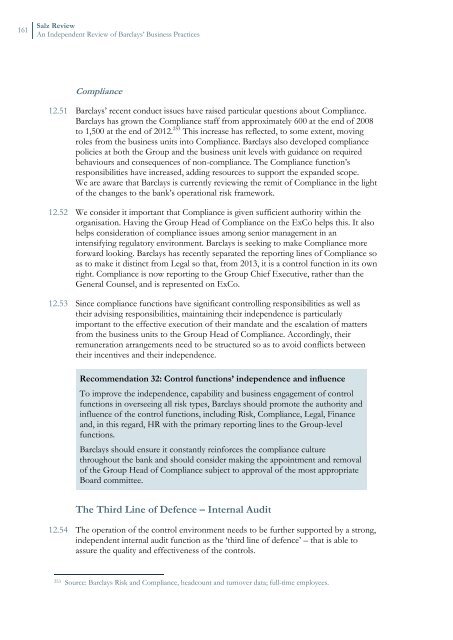Salz Review - Wall Street Journal
Salz Review - Wall Street Journal
Salz Review - Wall Street Journal
You also want an ePaper? Increase the reach of your titles
YUMPU automatically turns print PDFs into web optimized ePapers that Google loves.
161<br />
<strong>Salz</strong> <strong>Review</strong><br />
An Independent <strong>Review</strong> of Barclays’ Business Practices<br />
Compliance<br />
12.51 Barclays’ recent conduct issues have raised particular questions about Compliance.<br />
Barclays has grown the Compliance staff from approximately 600 at the end of 2008<br />
to 1,500 at the end of 2012. 253 This increase has reflected, to some extent, moving<br />
roles from the business units into Compliance. Barclays also developed compliance<br />
policies at both the Group and the business unit levels with guidance on required<br />
behaviours and consequences of non-compliance. The Compliance function’s<br />
responsibilities have increased, adding resources to support the expanded scope.<br />
We are aware that Barclays is currently reviewing the remit of Compliance in the light<br />
of the changes to the bank’s operational risk framework.<br />
12.52 We consider it important that Compliance is given sufficient authority within the<br />
organisation. Having the Group Head of Compliance on the ExCo helps this. It also<br />
helps consideration of compliance issues among senior management in an<br />
intensifying regulatory environment. Barclays is seeking to make Compliance more<br />
forward looking. Barclays has recently separated the reporting lines of Compliance so<br />
as to make it distinct from Legal so that, from 2013, it is a control function in its own<br />
right. Compliance is now reporting to the Group Chief Executive, rather than the<br />
General Counsel, and is represented on ExCo.<br />
12.53 Since compliance functions have significant controlling responsibilities as well as<br />
their advising responsibilities, maintaining their independence is particularly<br />
important to the effective execution of their mandate and the escalation of matters<br />
from the business units to the Group Head of Compliance. Accordingly, their<br />
remuneration arrangements need to be structured so as to avoid conflicts between<br />
their incentives and their independence.<br />
Recommendation 32: Control functions’ independence and influence<br />
To improve the independence, capability and business engagement of control<br />
functions in overseeing all risk types, Barclays should promote the authority and<br />
influence of the control functions, including Risk, Compliance, Legal, Finance<br />
and, in this regard, HR with the primary reporting lines to the Group-level<br />
functions.<br />
Barclays should ensure it constantly reinforces the compliance culture<br />
throughout the bank and should consider making the appointment and removal<br />
of the Group Head of Compliance subject to approval of the most appropriate<br />
Board committee.<br />
The Third Line of Defence – Internal Audit<br />
12.54 The operation of the control environment needs to be further supported by a strong,<br />
independent internal audit function as the ‘third line of defence’ – that is able to<br />
assure the quality and effectiveness of the controls.<br />
253 Source: Barclays Risk and Compliance, headcount and turnover data; full-time employees.
















